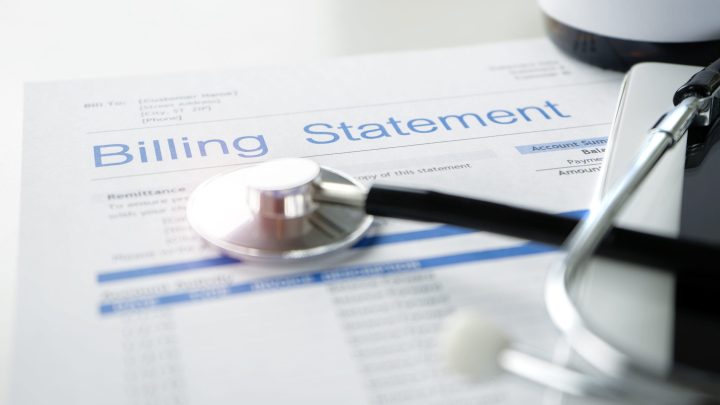
The push to erase medical debt is gaining speed
Medical debt, which impacts those with and without insurance, is a major issue across the country. Around 14 million people in the U.S. owe more than $1,000 in medical debt; some 3 million people owe more than $10,000.
The federal government and states across the country are pushing new policy to try and clamp down on the issue. Medical debt has also taken center stage in the presidential election, with Vice President Kamala Harris pushing to cancel medical debt for millions of Americans, according to an economic plan released earlier this month.
For more on how medical debt is being addressed at the state and federal level, “Marketplace Morning Report” host Sabri Ben-Achour spoke with Kim Nichols Dauner, a professor and director of Health Care Management at the University of Minnesota Duluth. The following is an edited transcript of their conversation.
Sabri Ben-Achour: Now, just this past Tuesday, the governor of New Jersey announced that $100 million worth of medical debt would be erased for about 50,000 people in that state; Connecticut and Illinois are doing something similar. Vice President Kamala Harris has called for more of this. How does that work? How does that get paid for?
Kim Nichols Dauner: So generally, those are taxpayer dollars going to pay off the medical debt of others, and so it’s kind of a one-time infusion of cash to paying down the debt of people.
Ben-Achour: How effective is that kind of policy? I ask because it’s one thing to get rid of debt one time, but it doesn’t prevent future people from falling into future debt, in the future?
Nichols Dauner: Right, absolutely. So on top of that, states need to put efforts together to really create good policy around medical debt that really helps people to avoid it and prevent it altogether. So while it’s great to take care of the people currently with medical debt, ideally we want a situation where people are not getting into medical debt in the first place.
Ben-Achour: Why is it such a persistent problem?
Nichols Dauner: So there’s a lot of reasons why it’s a persistent problem. Some of it has to do with the variation that different payers pay for different services. So if you took one particular service at one particular facility, every different payer would pay a different amount for that, and that variation can be sometimes on the order of five times, right — one payer might pay five times more than another payer. And then on top of that, it’s not always clear what burden of that becomes the consumers’. So helping decrease some of that variation in payment on health insurers would be one thing that could be done. Requiring more transparency in terms of who qualifies for financial assistance, how a person can obtain financial assistance, expanding the scope of that financial assistance — so all these things really play a role in helping people to never have medical debt to begin with.
Ben-Achour: In addition to calling for debt relief, Vice President Harris has proposed letting Medicare negotiate prescription drug costs down and do so more quickly, she helped get medical debt removed from credit reports. What should she or [Former] President Trump or any candidate be proposing to tackle this problem?
Nichols Dauner: Yeah, candidates can do a lot to help that issue. The National Consumer Law Center has some model legislation. They can focus on things that are consumer-oriented, such as putting in place limits for what collections can go after. They can look at provider-level solutions, so putting limits on the kind of fees facilities charge different entities. They can look at the insurance side of things, and they can look to make cost-sharing reduce out-of-pocket limits under the Affordable Care Act. There’s a lot of solutions that are out there that candidates could look at to see what would help more systematically.
Ben-Achour: Do you think that this issue is getting enough attention in this election cycle?
Nichols Dauner: Well, I’m happy to see it getting some attention. I do think, yeah, more attention would be great. It’s a issue that a lot of consumers face, and a lot of people could potentially face it. Nobody goes looking for medical debt, it just happens upon people.
Ben-Achour: Medical debt, medical costs — this is an issue that states have already been taking on. As I mentioned, some states have outright forgiven some medical debt; others have other strategies. What are some of the ways that states are tackling this problem that a federal government, a presidential candidate might want to pay attention to?
Nichols Dauner: Yeah, they’re strengthening requirements for financial assistance, so making sure the hospitals are transparent. Sometimes they’re expanding the venues for where people can get financial assistance. So looking beyond hospitals to like freestanding orthopedic centers, for example. They’re putting more requirements on community benefit, so nonprofit hospitals get a tax break under the IRS, and so making sure that that money actually is going to pay for care for individuals, as opposed to doing other things with that benefit.
They are regulating hospital and debt collectors billing and collection activities, looking at things like whether a hospital can sell that debt and to whom, regulating the practices of those places that they’re selling the debt to. They’re also putting limits on the ways in which debt collection works, in terms of like foreclosures and wage garnishment, things like sliding fee scales for wage garnishment, so that low-income people are not being disproportionately affected by that. And they’re also working on developing state-level reporting systems. So we don’t have a lot of data to understand what’s going on with medical debt and who’s getting the benefits of financial assistance, and is it working for all people effectively. So states are kind of working in those areas, and I think that’s going to give us a lot of good information for possibilities for federal legislation.
There’s a lot happening in the world. Through it all, Marketplace is here for you.
You rely on Marketplace to break down the world’s events and tell you how it affects you in a fact-based, approachable way. We rely on your financial support to keep making that possible.
Your donation today powers the independent journalism that you rely on. For just $5/month, you can help sustain Marketplace so we can keep reporting on the things that matter to you.


















